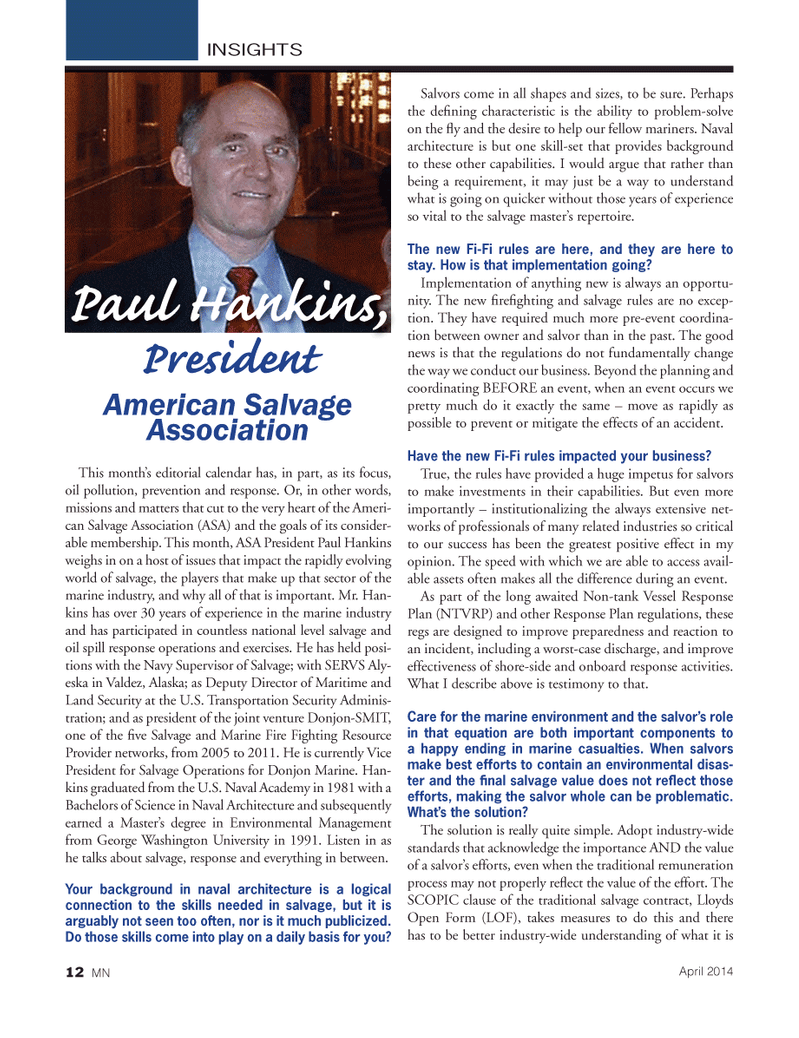
Page 12: of Marine News Magazine (April 2014)
Shipyard Report: Construction & Repair
Read this page in Pdf, Flash or Html5 edition of April 2014 Marine News Magazine
INSIGHTSThis month?s editorial calendar has, in part, as its focus, oil pollution, prevention and response. Or, in other words, missions and matters that cut to the very heart of the Ameri- can Salvage Association (ASA) and the goals of its consider- able membership. This month, ASA President Paul Hankins weighs in on a host of issues that impact the rapidly evolving world of salvage, the players that make up that sector of the marine industry, and why all of that is important. Mr. Han- kins has over 30 years of experience in the marine industry and has participated in countless national level salvage and oil spill response operations and exercises. He has held posi- tions with the Navy Supervisor of Salvage; with SERVS Aly- eska in Valdez, Alaska; as Deputy Director of Maritime and Land Security at the U.S. Transportation Security Adminis- tration; and as president of the joint venture Donjon-SMIT, one of the ve Salvage and Marine Fire Fighting Resource Provider networks, from 2005 to 2011. He is currently Vice President for Salvage Operations for Donjon Marine. Han- kins graduated from the U.S. Naval Academy in 1981 with a Bachelors of Science in Naval Architecture and subsequently earned a Master?s degree in Environmental Management from George Washington University in 1991. Listen in as he talks about salvage, response and everything in between. Your background in naval architecture is a logical connection to the skills needed in salvage, but it is arguably not seen too often, nor is it much publicized. Do those skills come into play on a daily basis for you?Salvors come in all shapes and sizes, to be sure. Perhaps the de ning characteristic is the ability to problem-solve on the y and the desire to help our fellow mariners. Naval architecture is but one skill-set that provides background to these other capabilities. I would argue that rather than being a requirement, it may just be a way to understand what is going on quicker without those years of experience so vital to the salvage master?s repertoire. The new Fi-Fi rules are here, and they are here to stay. How is that implementation going? Implementation of anything new is always an opportu- nity. The new re ghting and salvage rules are no excep- tion. They have required much more pre-event coordina- tion between owner and salvor than in the past. The good news is that the regulations do not fundamentally change the way we conduct our business. Beyond the planning and coordinating BEFORE an event, when an event occurs we pretty much do it exactly the same ? move as rapidly as possible to prevent or mitigate the effects of an accident. Have the new Fi-Fi rules impacted your business?True, the rules have provided a huge impetus for salvors to make investments in their capabilities. But even more importantly ? institutionalizing the always extensive net- works of professionals of many related industries so critical to our success has been the greatest positive effect in my opinion. The speed with which we are able to access avail- able assets often makes all the difference during an event. As part of the long awaited Non-tank Vessel Response Plan (NTVRP) and other Response Plan regulations, these regs are designed to improve preparedness and reaction to an incident, including a worst-case discharge, and improve effectiveness of shore-side and onboard response activities. What I describe above is testimony to that. Care for the marine environment and the salvor?s role in that equation are both important components to a happy ending in marine casualties. When salvors make best efforts to contain an environmental disas- ter and the nal salvage value does not re ect those efforts, making the salvor whole can be problematic. What?s the solution? The solution is really quite simple. Adopt industry-wide standards that acknowledge the importance AND the value of a salvor?s efforts, even when the traditional remuneration process may not properly re ect the value of the effort. The SCOPIC clause of the traditional salvage contract, Lloyds Open Form (LOF), takes measures to do this and there has to be better industry-wide understanding of what it is Paul Hankins, President American Salvage AssociationApril 201412 MNMN April14 Layout 1-17.indd 12MN April14 Layout 1-17.indd 123/20/2014 11:35:46 AM3/20/2014 11:35:46 AM

 11
11

 13
13
